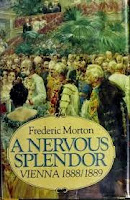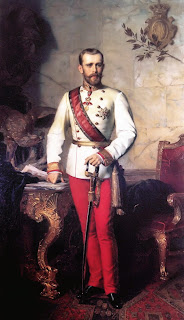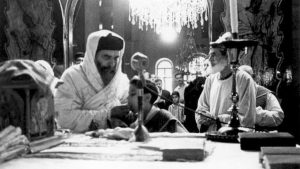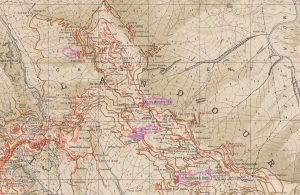That was last month. Last week it was like driving into autumn. We left Auckland in the morning, driving south to Turangi. In a few brief hours the colours on the trees deepened and brightened in their final flourish before the onset of winter. It was beautiful.
When we arrived in the lakeside town of Kuratau, I found myself driving, unexpectedly, into autumn and spring once again. However this time the journey took place in my imagination, as I was transported to a city I have never visited and into a century in which I have never lived.
Frederic Morton’s A Nervous Splendour: Vienna 1888/1889 (Viking, 1981) absorbed me in the darkened hours of each morning before the family awakened. When the author writes a sentence like this, before he leaves even the first paragraph of his Preface, were there any other plausible options than absorption?
I’ve tried to trace local tremors that began along a curve of the Danube, then echoed across the world to come thundering down into our own century (vii).
The story gains momentum through the Autumn of 1888. Morton weaves together the stories of different ones as the splendour of Vienna’s high society moves towards the celebration of Emperor Franz Joseph’s birthday and beyond.
Composers Johannes Brahms, Johann Strauss, Hugo Wolf and Anton Bruckner are there. A young neurologist called Sigmund Freud is there. The founding father of modern political Zionism, Theodor Herzl, is there. So also is the painter Gustav Klimt, the conductor Gustav Mahler, the composer-painter Arnold Schonberg, and the doctor-turned-writer Arthur Schnitzler. All their stories are told. Even philosopher Ludwig Wittgenstein is there (albeit ‘in his mother’s belly … (about to) haunt the philosophy of the next century’, 70). Add to these Viennese residents, the visits of Edward, Prince of Wales, and the German Emperor Wilhelm, and it is quite a muster of (male, yes I did notice!) characters. Never before has wikipedia received such an intense workout at my hands.
At the centre of the story is the Crown Prince Rudolf, with his thirtieth birthday falling in this same season. Rudolf was ‘the hero of a living fairytale’ (172). ‘He entranced crowds and leaders alike. Queen Victoria’s crustiness dissolved at the sight of him’ (34). When his turn to rule arrived, he would be determined to make ‘Vienna more seriously modern’ (42), separating himself from his father’s legacy.
The story passes through a midwinter’s day (30 January 1889) at Mayerling. You see, Rudolf was a troubled chap. He was both ‘lofty and lost’ (188). He was ‘wracked by protocol and emptiness … laboring through the posturings of high hospitality’ (215).
‘Politics had become futility … hopes for nourishment receded from his public to his private life. By the end of 1888 he saw in the gilded labyrinth around him only one figure worth clinging to: Mary Vetsera’ (175).
Yes, Rudolf became entwined with Mary, aged 17, who had ‘learned the art of consent though she never lived to reach the age of it’ (130). Together, it seemed as if they tried ‘to overcome an uncontrollably failing life with a controlled, willed, carefully shaped death’ (66). They entered together into some kind of suicide pact and at Mayerling they took their own lives. [So intrigued has the world been with this story that wikipedia references more than 15 movies, musicals, documentaries and ballets covering the events of that day].
Vienna was in the season of carnival. That was brought to a grinding halt as high society escaped the city – ‘only the people were left in the city, to starve, to shiver and to grieve’ (272). But the interwoven stories of the Viennese geniuses – Brahms, Strauss, Freud, Herzl, Mahler et al – continue on, retold in the finest detail.
All these talents served an intuition maturing first in Vienna; something important and green had turned golden and sick and petrified … (315)
By such paradox Vienna attained greatness after all. It bred the geniuses who foretold the modern wound. And Rudolf, too, became in time a sad but significant precursor. He was the herald of an alienation common to the youth of our day … Under today’s system the young often appear to be a generation of Rudolfs: free and glamorous in theory, crushingly impotent in action; … free to see themselves as unbounded individuals without ever arriving at successful individuality; free to press pleasure to numb excess; … free to sound the depths of sophisticated frustration.
The shots in the Vienna Woods were fired in 1889. Today and every day hundreds of other unnerved fingers are already crooked into hundreds of other triggers. Each time we hear of another strange young death in a ‘good’ house we hear of another Mayerling (316).
The story travels on to Easter Saturday in the Spring of 1889. ‘Everything swelled and brightened toward Easter’ (316). That Viennese specialty, ‘the art of making life unserious’ (299) reasserts itself. ‘The chill had passed’ (301). ‘There was not a branch in the Vienna Woods that wasn’t greening’ (317). As yet another grand musical event fills the city with sound, Morton concludes his book with mention of a thin cry, first uttered on that Easter Saturday, commemorating the darkest day that history has ever known – a cry which carries with it a chill all of its own.
It was the thin cry of a baby born that afternoon. The parents were Alois and Klara Hitler. They named their little one Adolf (317).
And next week it is back to spring-less, autumn-less life in Bangalore, filled with heat and rain and the delights which come with it – like mangoes.
Paul
About Me

the art of unpacking
After a childhood in India, a theological training in the USA and a pastoral ministry in Southland (New Zealand), I spent twenty years in theological education in New Zealand — first at Laidlaw College and then at Carey Baptist College, where I served as principal. In 2009 I began working with Langham Partnership and since 2013 I have been the Programme Director (Langham Preaching). Through it all I've cherished the experience of the 'gracious hand of God upon me' and I've relished the opportunity to 'unpack', or exegete, all that I encounter in my walk through life with Jesus.
Recent Posts
Football helps me train preachers. See, when you speak to me about football—or, ‘footie’—I need to know where your feet are before I can understand what you mean. Are your feet in Ireland, or Brazil, or the USA, or NZ—or in crazy Australia? It must be the most fanatical sporting nation in the world. Within…
Having been born in 1959, I don’t remember much about the 1960s. But I have heard a lot. Hippies. Drugs. Rock ‘n Roll. Assassinations. Moon-walking. A quick trip across to ChatGPT informs me immediately that it was ‘a transformative decade across the world’—marked by the civil rights and feminist movements, Cold War tensions, consumerism and…









